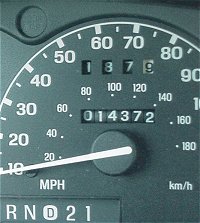
Fines |
Be on alert |
Laundered titles |
Mileage and wear |
Test drive |
Second opinion |
Odometer statement |
Former owner |
Accuracy check
Odometer tampering costs millions
Odometer tampering is a consumer fraud that costs Wisconsin citizens millions of dollars. It is particularly offensive because it hits those hardest who are least able to afford costly repairs. It benefits unscrupulous operators, frequently from other states, who conspire to defraud you.
Tamperers face fines and jail time
Resetting, disconnecting or altering a vehicle’s odometer to conceal the true mileage is called "odometer tampering." It is illegal for anyone to tamper with an odometer, or to knowingly sell a vehicle with a tampered odometer without disclosing it to the purchaser.
Whether tampering is done by a backyard mechanic who resets the odometer before trading for a new car, by a person who buys a gadget to keep miles from registering on the odometer, by a dealer who contracts with a "reconditioning" firm, or by a multi-state used car mill, odometer tampering violates state and federal laws, and is punishable by fines, imprisonment or both.
Be on alert
A study conducted by the National Highway Traffic Safety Administration (NHTSA) concluded that there is a 3.5% chance that a car has a turned-back odometer. Vehicles formerly owned by leasing companies are often late model vehicles with high mileage. That makes them tempting targets for odometer tampering specialists who turn them into late model, low mileage gems that are highly desirable on the used car market.
Odometer spinners launder titles out of state
Being aware of the problem, and knowing what to look for when buying a car is your best safeguard against odometer fraud.
Remember, odometers aren’t tamper proof. With the right simple, inexpensive tools, a crafty odometer spinner can erase several thousand miles from a vehicle’s odometer within minutes. Odometer spinners know how to "launder" a title history by transferring vehicle ownership from state to state so that it is difficult for investigators to determine where and when the fraud occurred.
Make sure mileage and wear make sense
Take a long, careful look at the vehicle. Does the condition match the miles on the odometer? Are the miles low, but the tires new or mismatched by size, type or brand? The date the tire was manufactured can be determined by coded numbers found on the tire. Have parts been replaced that normally would not have been replaced on a low mileage vehicle? Pay attention to parts such as batteries, hoses and clamps, and fan or air conditioning belts. Is there excessive wear in the interior, especially in the driver’s area?
Look for maintenance stickers, warranties or other paperwork that may indicate a higher mileage. They may be found under the hood, on the air cleaner, on door jambs, in the glove box, under seats or in the trunk.
Test drive the vehicle
A thorough test drive is essential. Check the brakes, steering, suspension, acceleration and alignment. Test the vehicle when it is cold and warm, at highway and city speeds.
Get a second opinion
Ask a qualified mechanic to test drive and examine the vehicle. Also, ask that the wheels be removed so the mechanic can inspect the brake system for excessive wear or replacement parts. Paying for an expert inspection before you buy may help you avoid unexpected repair costs and a lot of grief later on.
Read the owner’s odometer statement on the title
Under state and federal law, the seller - whether an individual or dealer - must provide the buyer with a written odometer statement. (Vehicles model year 2009 or older, or with a gross weight rating of more than 16,000 pounds are exempt from this requirement.) Wisconsin and most other states show the odometer statement on the title. Ask the seller to show you the title. Make sure the current mileage on the vehicle’s odometer is greater than the mileage shown on the title. Alterations or erasures make the title invalid. If the title is in a dealership name, or the title has been transferred from dealer to dealer, be on your guard. This could indicate a tampering problem.
Talk to the former owner
Wisconsin dealers are required to provide prospective buyers with the names and address of a vehicle’s former owner upon request. If the title shows that the vehicle was previously titled out of state, seriously consider checking further before you buy. For more information about vehicle history call Wisconsin Department of Transportation (WisDOT) Dealer & Agent Section at (608) 266-1425 or email at:
DealerLicensingUnit@dot.wi.gov.
For more information or help
The WisDOT Dealer & Agent Section licenses and regulates the motor vehicle industry, and resolves disputes about dealership sales and warranty repairs. They also investigate complaints about odometer tampering involving dealerships and private sellers.
To file a complaint
For important information about filing a dealer complaint,
please see our dealer complaint page.
If you suspect your vehicle’s odometer has been tampered with, or you would like more information about odometer regulations: